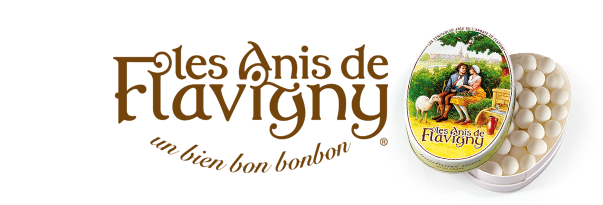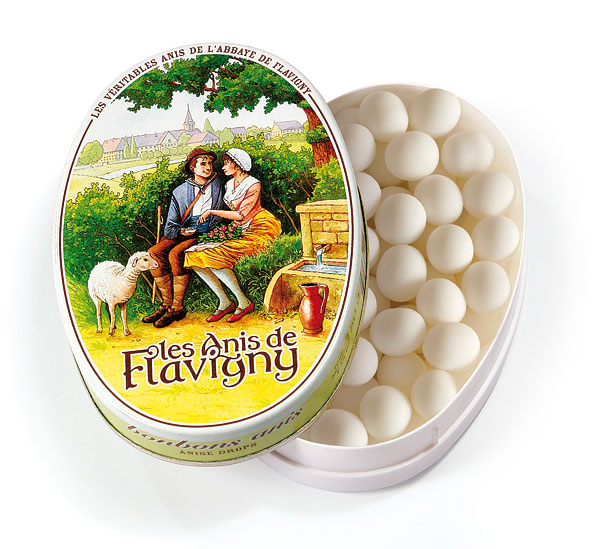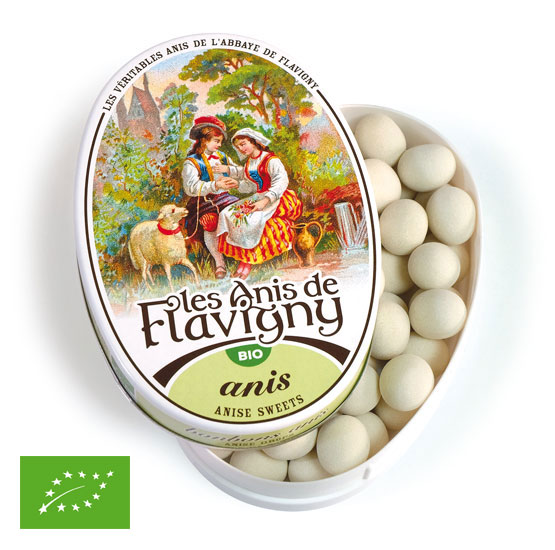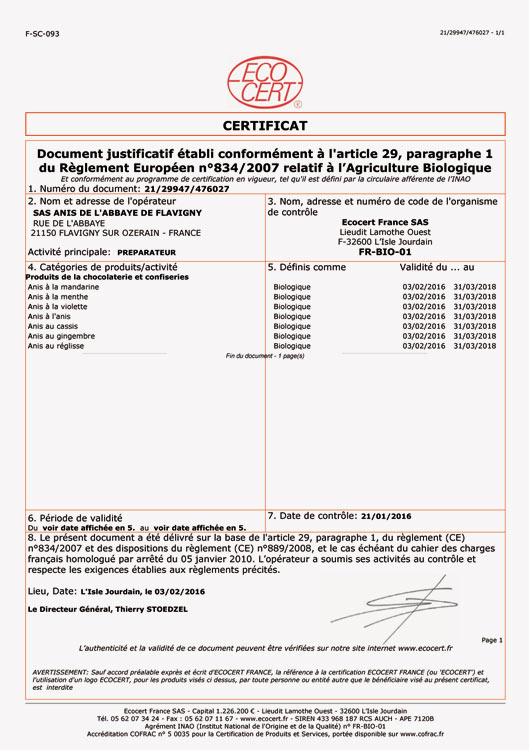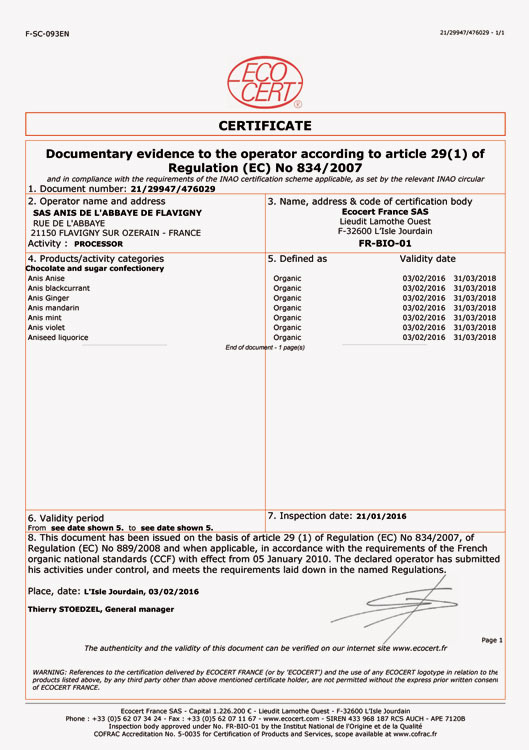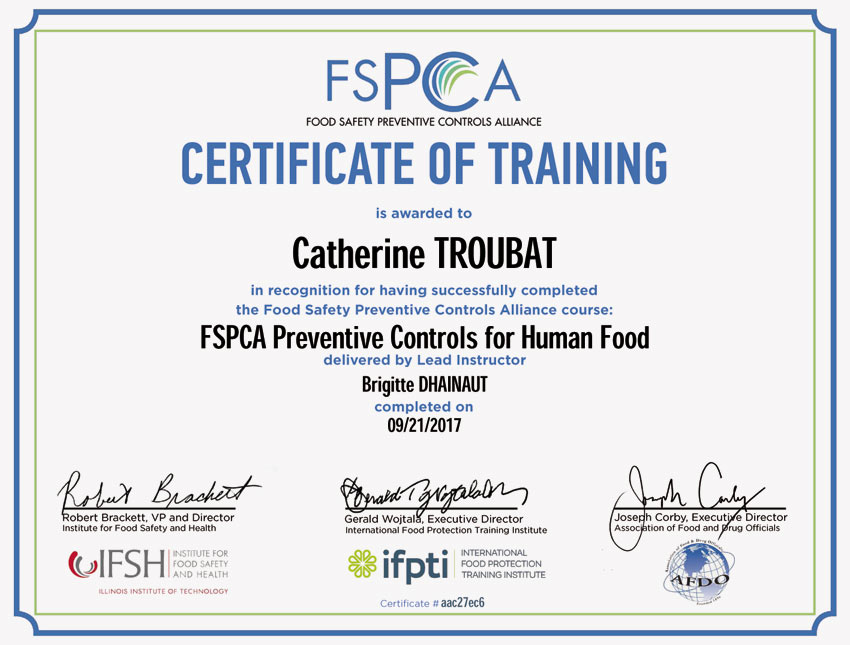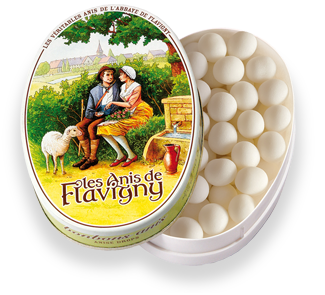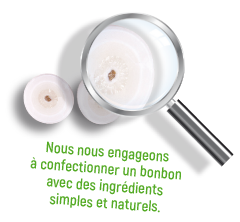 Our product commitments
Our product commitments
The quality of our sweets is really important to us and explains why our team works each and every day to respect our recipe and select only the best ingredients, packaging and suppliers, who we subject to regular auditing and in whom we have the utmost confidence.
Our classic range
Les Anis de Flavigny® are made using 3 or 4 ingredients: a green anise seed (Pimpinella Anisum), beet sugar and a natural flavouring. A plant extract is added to enhance the flavour of the rose, violet, lemon, orange flower and blackcurrant flavours.
We select only natural raw materials that do not contain any insecticides, fungicides, herbicides or heavy metals. We ensure that suppliers provide us with their own analyses and then carry out additional analyses on consignments delivered to our factory.
We select our green anise seed within the Mediterranean region for the quality of its flavour. This fragile plant is vulnerable to rain, wind and storms and so it isn’t possible to harvest mature plants (highest levels of anethenol) in France.
The sugar beet is harvested in northern France, and then processed in a refinery in Champagne-Ardenne, which neighbours the Bourgogne region.
As for our flavourings, they are completely natural as well: aniseed, rose, violet, orange flower, blackcurrant, mint, liquorice, mandarin, ginger, lemon and coffee. For many years we have predominantly worked with the flavour specialists of Grasse, a town that is well-known for its centuries-old flavouring expertise.
Our organic range
The sugar comes from organic sugar cane. Currently our organic sugar comes from Brazil. Our aniseed and mint flavours, in addition to being totally natural, are certified as organic. The ingredients in our organic range and our suppliers are certified by Ecocert. Organic standards are a real commitment to environmental well-being and protection because they exclude any synthetic pesticide, fertiliser, antibiotic etc. products.
By refusing to use these chemical products on crops, organic farming preserves soil fertility and water quality. Respecting nature also means promoting biodiversity by choosing plant species that are suited to their environment and can be harvested when mature.
VEGAN sweet
Les Anis de Flavigny® sweets are composed of 3 or 4 plant-based ingredients. They are suitable for vegetarians and vegans. Our manufacturing process does not involve animals in any way, which means all our ranges are vegan-friendly!
Our packaging
The oval boxes, round boxes and sachets are made in France. Our cardboard packets are printed in Germany, in the neighbouring region to Alsace. We use materials that can easily be separated in order to make sorting and recycling easier. More information is available on our website: Beautiful tins.
Different naming conventions depending on the amount or quantity of the plant named as the flavour of the sweet
• “Natural plant-based flavour” (aniseed, mint, liquorice, coffee and ginger): consists of a natural flavour that is 95% extracted from the plant in question. The remaining 5% are also natural substances derived from other plants and which give our sweets their distinctive flavour and aromatic note.
• “Natural plant-based flavour with other natural flavours” (rose and mandarin): consists of a natural flavour of which less than 95% is extracted from the plant in question and from other plants that enhance the characteristic note of the natural flavour being sought.
• “Natural flavour” (violet, orange flower, lemon and blackcurrant): consists of a natural plant extract flavour, but not predominantly the flavour of the plant indicated on the box. Some plants, if not enhanced by others, are not sufficiently flavoursome to meet the characteristic flavour requirement of consumers. Flavour specialists generally add plant-derived essential oils, the taste of which corresponds with the expected flavour, into their mix. For example, we have chosen to add sage extract into our natural flavour to enhance the taste of blackcurrant.
A “free from” fanfare!
Only 3 to 4 ingredients: sugar, a green anise seed, a natural flavour and an extract.
Free from artificial colours
(synthetic substances derived from the chemical industry) The slight colour of our sweets (that is most perceptible for blackcurrant, coffee and liquorice flavoured Anis de Flavigny) is a result of the natural colour of our flavourings.
Free from nanoparticles
(nanoparticules, the smallest of which have a diametre of less than 100 nanometres, help to modify colour, smell, fluidity and even the texture of a product. They are potentially carcinogenic) Our sweets contain no added additives, colours or ingredients containing nanoparticles.
So, they are free from titanium oxide
(titanium oxide was used to make some sweets and chewing-gums perfectly white) We don’t use any colours or titanium oxide in our sweets. They are naturally white as they take on the colour of the sugar. This means that organic sweets have a slightly grey-gold hue to them as the organic sugar is slightly less crystalline than conventional sugar.
Free from artificial flavours
(substances derived from the chemical industry and don’t exist in nature) All of our sweets are flavoured with a natural flavouring that is obtained by steam or beet alcohol distillation of plant extracts.
Free from artificial preservatives
(derived from the chemical industry, they make it possible to extend the product’s lifespan) For our Anis® sweets, the sugar itself is a natural preservative that has been in use since well before the 16th century. Stored in a dry environment, they can be kept and enjoyed for several decades!
Free from lactose
(carbohydrate found in milk and dairy products) There are no ingredients containing lactose in our sweets.
Free from artificial sweeteners
(substances of natural or synthetic origin, they impart a sweet flavour (aspartame, saccharine, sucralose, maltitol, mannitol, sorbitol, stevia, agave syrup … xylitol). As with natural sugars, artificial sweeteners disrupt the body’s ability to regulate blood sugar levels. This can provoke metabolic changes that can be the precursor to diabetes) Only beet and cane-derived granulated sugars are used in our sweets, which is why our recipe hasn’t been changed since 1591.
Free from citric acid
(citric acid, a naturel product, comes from lemons. It is frequently used to add a touch of acidity to a flavour. The combination of sugar and citric acid in the mouth triggers and stimulates the growth of the bacteria that cause tooth decay) Our Anis sweets don’t contain citric acid.
Free from malic acid
(natural malic acid can be found in apples, pears and grapes. As with citric acid, the combination of sugar and malic acid in the mouth triggers and stimulates the growth of bacteria that cause tooth decay) Our Anis sweets don’t contain malic acid.
Free from gluten
(a cereal-derived protein. Some people suffer from gluten intolerace) Our factory only produces Anis de Flavigny® sweets. Our ingredients do not come into contact with other foodstuffs, and therefore have no contact with gluten.
Free from peanuts and other nuts
(some people may be allergic to this foodstuff) Our factory does not work with these ingredients. There is a strict adherence to hygiene rules, which ensures that no allergens are introduced into the production environment.
Free from GMOs
(living organism whose genetic heritage has been modified through human intervention) Our suppliers are committed to us through their certification processes and commitments listed on their technical information sheets to not produce or harvest GM plants.
Free from fipronil
(agrochemical and anti-parasitical veterinary product, the molecules of which may contaminate eggs if it is used in the egg production process) Eggs are not used in the production of our sweets.
Free from bisphenol A (BPA)
(chemical plastifying and anti-oxidant component) The law forbids the use of BPA in any food packaging production. Our packaging does not contain any.
Free from phthalates
(phthalic acid derivatives, often used in plastics) Our packaging doesn’t contain any of these chemical agents.
Free from starch
(used to thicken products) Our sweets are produced using only the flavoured granulated sugar that surrounds the little anise seed.
Sugar… to be avoided?
Like salt-rich foods, sugar should be consumed in moderation. In addition to a varied diet with reasonable quantities to suit your activity and stature, and taking care not to nibble between meals, it’s a good idea to take part in gentle, regular exercise. Don’t forget to brush your teeth after every meal! For information, each “original” Anis de l’Abbaye de Flavigny® weighs around 1 gram, equivalent to 4 calories per candy. One Anis de Flavigny® is roughly equivalent to 1/6 of a sugar cube. 1 sugar cube size n°4 weighs 5.95 grams and is equivalent to 24 kcal. Our candy should therefore be consumed in moderation.
Technical information
Our quality control method and food safety procedures conform with HACCP requirements. This means that we check:
• our ingredients (analysis, certification, supplier audit, check that there are no allergens),
• the hygiene of our production site and of our tools, production machines and our staff as well as our cleaning procedures,
• strict adherence to our production recipe.
It is a question of anticipating all possible eventualities and risks and knowing how to react in advance.
HACCP is a method based on 7 principles
PRINCIPLE 1: carry out a hazard analysis (of ingredients, production tools, personnel hygiene, cooking methods, etc.).
By hazard, we mean allergens, cold breaks, etc.
PRINCIPLE 2: Determine critical control points (CCP).
This involves identifying where there could be a hazard, in order to systematically ensure compliance with instructions, for example regarding cooking temperatures.
Agri-food businesses inform, train and monitor operators’ actions with regard to each source of potential hazard identified.
PRINCIPLE 3: determine critical level(s). For example, for temperature, this would mean determining temperature limits that must not be exceeded.
PRINCIPLE 4: implementation of a monitoring system that makes it possible to control the CCPs.
PRINCIPLE 5: define corrective measures to implement should monitoring indicate that any particular CCP is not under control.
PRINCIPLE 6: apply verification procedures to ensure that the HACCP system is working effectively.
PRINCIPLE 7: create a dossier containing all procedures and records of these principles and their implementation.
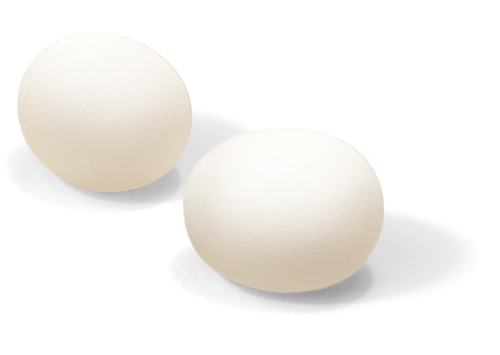 “Our really lovely sweet for a really lovely moment, so take the time to enjoy it without biting into it… Remember that it takes us 2 weeks to make it! Thank you for choosing it.”
“Our really lovely sweet for a really lovely moment, so take the time to enjoy it without biting into it… Remember that it takes us 2 weeks to make it! Thank you for choosing it.”
Catherine Troubat, Chairperson Anis de Flavigny
